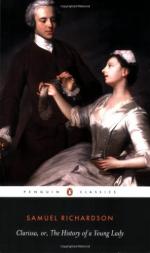Pr’ythee, Belford, forgive my nonsense, and my Vulcan-like metaphors—Did I not tell thee, not that I am sick of love, but that I am mad with it? Why brought I such an angel into such a house? into such company?—And why do I not stop my ears to the sirens, who, knowing my aversion to wedlock, are perpetually touching that string?
I was not willing to be answered so easily: I was sure, that what passed between two such young ladies (friends so dear) might be seen by every body: I had more reason than any body to wish to see the letters that passed between her and Miss Howe; because I was sure they must be full of admirable instruction, and one of the dear correspondents had deigned to wish my entire reformation.
She looked at me as if she would look me through: I thought I felt eye-beam, after eye-beam, penetrate my shivering reins.—But she was silent. Nor needed her eyes the assistance of speech.
Nevertheless, a little recovering myself, I hoped that nothing unhappy had befallen either Miss Howe or her mother. The letter of yesterday sent by a particular hand: she opening it with great emotion—seeming to have expected it sooner—were the reasons for my apprehensions.
We were then at Muswell-hill: a pretty country within the eye, to Polly, was the remark, instead of replying to me.
But I was not so to be answered—I should expect some charming subjects and characters from two such pens: I hoped every thing went on well between Mr. Hickman and Miss Howe. Her mother’s heart, I said, was set upon that match: Mr. Hickman was not without his merits: he was what the ladies called a sober man: but I must needs say, that I thought Miss Howe deserved a husband of a very different cast!
This, I supposed, would have engaged her into a subject from which I could have wiredrawn something:—for Hickman is one of her favourites— why, I can’t divine, except for the sake of opposition of character to that of thy honest friend.
But she cut me short by a look of disapprobation, and another cool remark upon a distant view; and, How far off, Miss Horton, do you think that clump of trees may be? pointing out of the coach.—So I had done.
Here endeth all I have to write concerning our conversation on this our agreeable airing.
We have both been writing ever since we came home. I am to be favoured with her company for an hour, before she retires to rest.
All that obsequious love can suggest, in order to engage her tenderest sentiments for me against tomorrow’s sickness, will I aim at when we meet. But at parting will complain of a disorder in my stomach.
***
We have met. All was love and unexceptionable respect on my part. Ease and complaisance on her’s. She was concerned for my disorder. So sudden!—Just as we parted! But it was nothing. I should be quite well by the morning.




